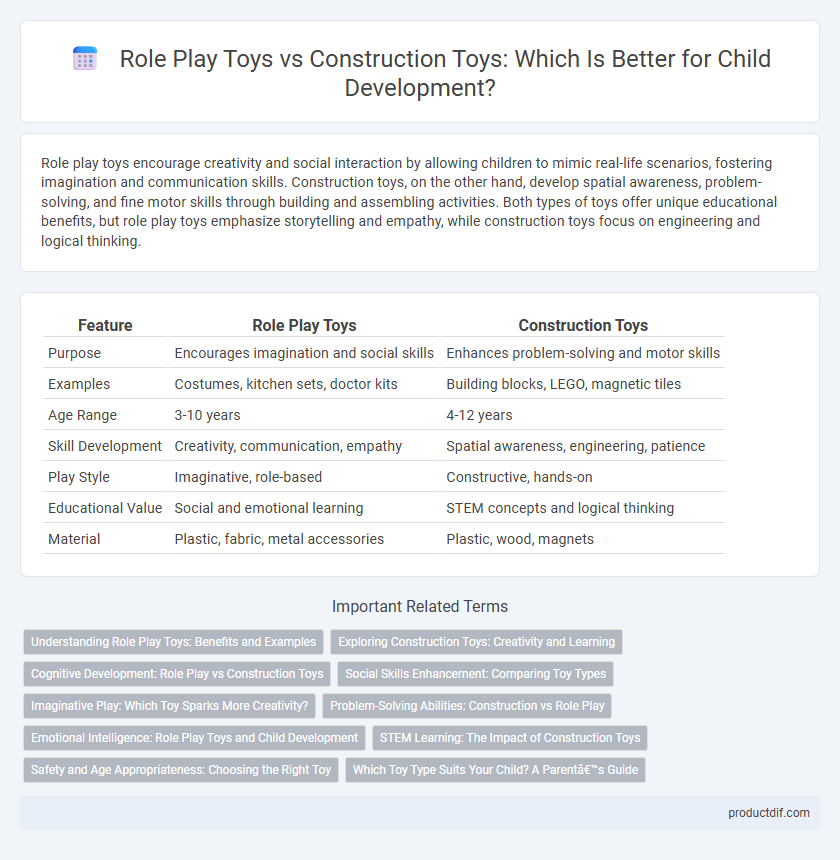Role play toys encourage creativity and social interaction by allowing children to mimic real-life scenarios, fostering imagination and communication skills. Construction toys, on the other hand, develop spatial awareness, problem-solving, and fine motor skills through building and assembling activities. Both types of toys offer unique educational benefits, but role play toys emphasize storytelling and empathy, while construction toys focus on engineering and logical thinking.
Table of Comparison
| Feature | Role Play Toys | Construction Toys |
|---|---|---|
| Purpose | Encourages imagination and social skills | Enhances problem-solving and motor skills |
| Examples | Costumes, kitchen sets, doctor kits | Building blocks, LEGO, magnetic tiles |
| Age Range | 3-10 years | 4-12 years |
| Skill Development | Creativity, communication, empathy | Spatial awareness, engineering, patience |
| Play Style | Imaginative, role-based | Constructive, hands-on |
| Educational Value | Social and emotional learning | STEM concepts and logical thinking |
| Material | Plastic, fabric, metal accessories | Plastic, wood, magnets |
Understanding Role Play Toys: Benefits and Examples
Role play toys enhance creativity and social skills by encouraging children to imitate real-life scenarios, such as playing with kitchen sets, doctor kits, and dress-up costumes. These toys promote emotional development and language skills by enabling children to express themselves and understand different perspectives. Examples include puppet theaters, tool benches, and pretend grocery stores, which support imaginative play and collaborative interaction.
Exploring Construction Toys: Creativity and Learning
Construction toys, such as LEGO and Mega Bloks, enhance spatial awareness and problem-solving skills by encouraging children to design and build complex structures. These toys foster creativity and critical thinking while teaching basic engineering principles and fine motor coordination. Integrating STEM concepts, construction toys support cognitive development and provide an interactive learning experience through hands-on play.
Cognitive Development: Role Play vs Construction Toys
Role play toys enhance cognitive development by fostering creativity, language skills, and social understanding through imaginative scenarios and symbolic thinking. Construction toys improve spatial reasoning, problem-solving abilities, and fine motor skills by encouraging hands-on manipulation of shapes and structures. Both toy types engage different cognitive domains, with role play emphasizing narrative and emotional intelligence, while construction toys focus on logical thinking and engineering concepts.
Social Skills Enhancement: Comparing Toy Types
Role play toys foster social skills by encouraging imaginative scenarios and collaborative storytelling, which enhance communication and empathy among children. Construction toys promote problem-solving and teamwork as kids work together to build structures, improving cooperation and shared goal-setting qualities. Both toy types are essential for developing different aspects of social interaction and cognitive flexibility.
Imaginative Play: Which Toy Sparks More Creativity?
Role play toys stimulate creativity by encouraging children to embody different characters and scenarios, fostering language development and social skills through imaginative storytelling. Construction toys promote creativity by allowing kids to design and build structures, enhancing spatial awareness and problem-solving abilities. Both toy types uniquely contribute to imaginative play, with role play focusing more on narrative creativity and construction toys emphasizing creative engineering and design.
Problem-Solving Abilities: Construction vs Role Play
Construction toys enhance problem-solving abilities by encouraging spatial reasoning, logical thinking, and engineering skills through hands-on building challenges. Role play toys foster creativity and social problem-solving by simulating real-life scenarios, allowing children to practice communication, empathy, and decision-making. Both toy types contribute uniquely to cognitive development, with construction toys focusing on analytical skills and role play toys emphasizing interpersonal problem-solving.
Emotional Intelligence: Role Play Toys and Child Development
Role play toys significantly enhance emotional intelligence in children by encouraging empathy, self-awareness, and social skills through imaginative scenarios and character interaction. These toys create opportunities for children to practice communication, manage emotions, and understand diverse perspectives, fostering essential emotional development. In contrast, construction toys primarily develop problem-solving and spatial skills, making role play toys more effective tools for nurturing emotional intelligence during early childhood.
STEM Learning: The Impact of Construction Toys
Construction toys significantly enhance STEM learning by promoting critical thinking, spatial awareness, and engineering skills through hands-on problem-solving activities. Unlike role play toys, which foster creativity and social skills, construction toys encourage logical reasoning and understanding of physics principles, supporting early development in math and science. Research shows children engaged with building blocks and mechanical sets demonstrate improved performance in STEM subjects and greater interest in technology careers.
Safety and Age Appropriateness: Choosing the Right Toy
Role play toys and construction toys differ significantly in safety considerations and age appropriateness; role play toys often contain small accessories that pose choking hazards for children under three years, while construction toys are designed with interlocking parts suitable for older kids to develop fine motor skills and spatial reasoning. Selecting the right toy requires evaluating the child's developmental stage and ensuring the toy meets safety standards such as ASTM F963 or EN71 certifications. Prioritizing age-appropriate playthings reduces injury risks and enhances creative, cognitive growth during early childhood.
Which Toy Type Suits Your Child? A Parent’s Guide
Role play toys enhance creativity and social skills by allowing children to immerse themselves in imaginative scenarios, making them ideal for kids who enjoy storytelling and interaction. Construction toys, such as building blocks and kits, develop spatial awareness, problem-solving, and fine motor skills, perfect for children who prefer hands-on, structured play. Parents should consider their child's interests and developmental needs to choose between stimulating imaginative play or fostering logical thinking with these toy types.
Role Play Toys vs Construction Toys Infographic

 productdif.com
productdif.com